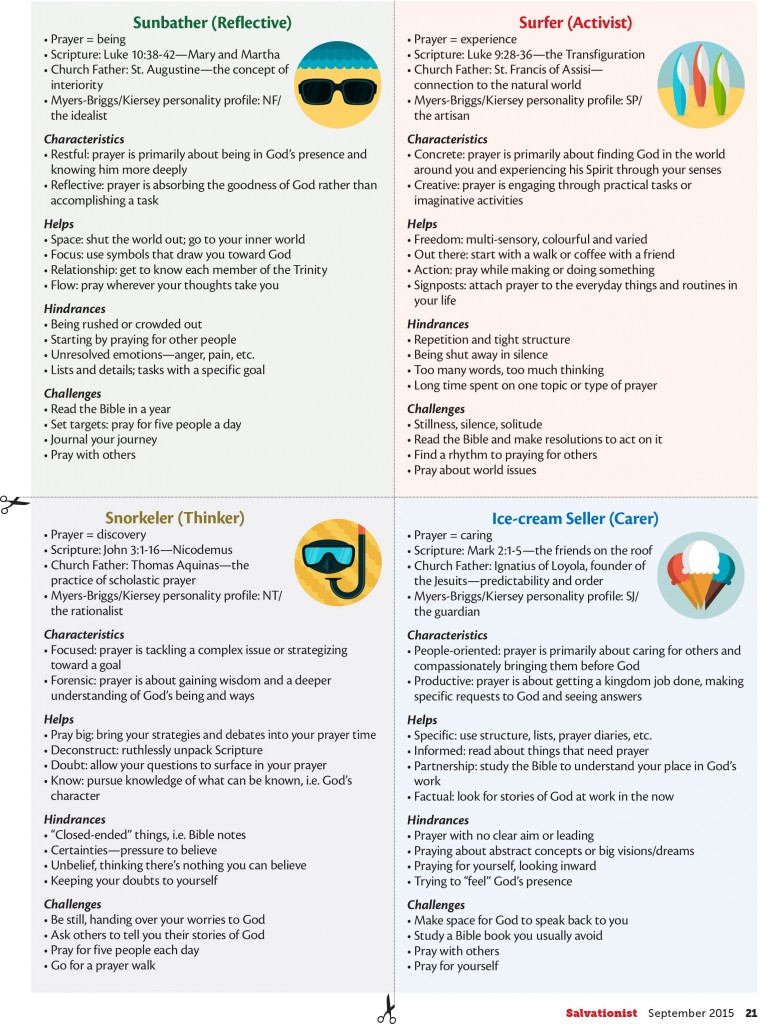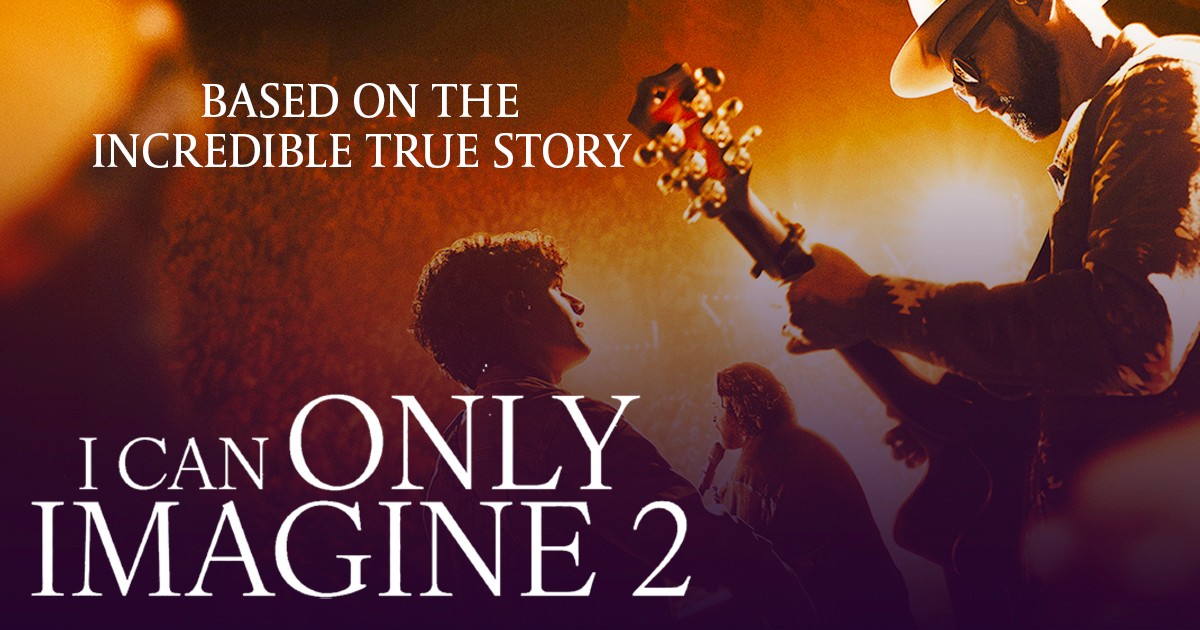I once visited a retreat centre where the meals were eaten in silence. The guests assembled silently, chose their food from the buffet silently and sat together to eat silently. Some found the silence relaxing, even refreshing. Others quickly gathered outside the dining room doors as soon as the meal was over, eager to break the silence with boisterous talk.
How we communicate with each other reflects our personalities. Extroverts are energized by talk, activity and people. Introverts, although they can enjoy crowds, are energized by time alone. Extroverts never seem stuck for words; they talk in order to clarify what they are thinking and feeling. Introverts prefer to internally process their thoughts before speaking them.
How we communicate with each other is also connected to how we communicate with God—how we pray. Ruth Fowke begins her book, Personality and Prayer: Finding and Extending the Prayer Style that Suits your Personality, with a quote from Abbot John Chapman: “Pray as you can, don't try to pray as you can't.” This clumsy sentence offers liberating advice. Prayer is not “one size fits all.” We are all different and what fits for one may not fit for another.
As an introvert, I need to enter my prayer space, close the door behind me and quietly read Scripture. I meditate on written prayers or songs in the song book. I do not close the door to keep the world out, but to intentionally give God the whole of my attention.
Unfortunately, most writing and teaching on the subject of prayer has been done by introverts, leading some to think this is the “right” way to pray—alone, without interruptions. But there are many different ways to pray. No one way is more right than another.
Prayer that fits the extroverted personality may involve activity—walking the dog, gardening or driving the car. Ruth Haley Barton, author of numerous books on the spiritual life, does her evening prayer of examen while enjoying an end-of-day walk. Theologian and author Richard Foster prays while shooting baskets.
“Prayer is about finding the most suitable rhythm to enable one to develop a meaningful, vibrant relationship with the living God,” writes Fowke. “God has chosen to make us all different from one another. Each of us must find the prayer pattern that is most suited to foster the development of our relationship with the Creator God.”
This was the focus of the officers' retreat, Ontario Great Lakes Division, in 2011. Lyndall Bywater, who was The Salvation Army's prayer co-ordinator in the United Kingdom, used a creative comparison to teach lessons on prayer and personality. She suggested that we can know what prayer style works best for us based on what we choose to do at the beach. Some are sunbathers, some are ice-cream sellers, some are surfers and some are snorkelers.
When I learned that my personality was paired with Ignatian spirituality, I set out to learn more about St. Ignatius of Loyola, the founder of the Jesuits, to see if I would truly resonate with his methods of prayer. I discovered prayer resources on the Jesuit website Sacred Space (www.sacredspace.ie) and started listening to prayers from www.pray-as-you-go.org. After reading about an Ignatian prayer retreat in the book Other Voices by Major Christine Faragher, I signed up for an online retreat through Creighton University. This 30-week, self-guided retreat offers prayer exercises that have helped me pay attention to the movements of God in my life.
John Calvin wrote, “There is no deep knowing of God without a deep knowing of self and no deep knowing of self without a deep knowing of God.” Augustine prayed, “Grant Lord, that I may know myself that I may know thee.” Knowing your personality, who God made you to be, is a path to knowing God. As you discover what prayer style best matches your personality, your relationship with God will be enriched.
Lt-Colonel Ann Braund is the territorial secretary for spiritual life development and the chaplain at Toronto's Broadview Village.
What is your prayer style? See the below chart for ways to go deeper in prayer, based on your personality (Courtesy: Lyndall Bywater)

How we communicate with each other reflects our personalities. Extroverts are energized by talk, activity and people. Introverts, although they can enjoy crowds, are energized by time alone. Extroverts never seem stuck for words; they talk in order to clarify what they are thinking and feeling. Introverts prefer to internally process their thoughts before speaking them.
How we communicate with each other is also connected to how we communicate with God—how we pray. Ruth Fowke begins her book, Personality and Prayer: Finding and Extending the Prayer Style that Suits your Personality, with a quote from Abbot John Chapman: “Pray as you can, don't try to pray as you can't.” This clumsy sentence offers liberating advice. Prayer is not “one size fits all.” We are all different and what fits for one may not fit for another.
As an introvert, I need to enter my prayer space, close the door behind me and quietly read Scripture. I meditate on written prayers or songs in the song book. I do not close the door to keep the world out, but to intentionally give God the whole of my attention.
Unfortunately, most writing and teaching on the subject of prayer has been done by introverts, leading some to think this is the “right” way to pray—alone, without interruptions. But there are many different ways to pray. No one way is more right than another.
Prayer that fits the extroverted personality may involve activity—walking the dog, gardening or driving the car. Ruth Haley Barton, author of numerous books on the spiritual life, does her evening prayer of examen while enjoying an end-of-day walk. Theologian and author Richard Foster prays while shooting baskets.
“Prayer is about finding the most suitable rhythm to enable one to develop a meaningful, vibrant relationship with the living God,” writes Fowke. “God has chosen to make us all different from one another. Each of us must find the prayer pattern that is most suited to foster the development of our relationship with the Creator God.”
This was the focus of the officers' retreat, Ontario Great Lakes Division, in 2011. Lyndall Bywater, who was The Salvation Army's prayer co-ordinator in the United Kingdom, used a creative comparison to teach lessons on prayer and personality. She suggested that we can know what prayer style works best for us based on what we choose to do at the beach. Some are sunbathers, some are ice-cream sellers, some are surfers and some are snorkelers.
- Sunbathers lie down on a blanket and bask in the sun. Prayer is about being restful and reflective, absorbing the goodness of God. This personality needs time and space to enter into and enjoy God's presence.
- Surfers are the ones organizing play and activity. Sitting around is too boring. Prayer for this personality is about finding God in the world around them and experiencing his Spirit through their senses.
- Ice-cream sellers work. They are the ones who organize the food. For these people, prayer is about caring and doing. They have prayer lists and journals filled with needs and names from around the world.
- Snorkelers dive down deep. They want to examine what is below the surface. For these people, prayer is about going deeper to discover the mysteries of God and the truth of his Word.
When I learned that my personality was paired with Ignatian spirituality, I set out to learn more about St. Ignatius of Loyola, the founder of the Jesuits, to see if I would truly resonate with his methods of prayer. I discovered prayer resources on the Jesuit website Sacred Space (www.sacredspace.ie) and started listening to prayers from www.pray-as-you-go.org. After reading about an Ignatian prayer retreat in the book Other Voices by Major Christine Faragher, I signed up for an online retreat through Creighton University. This 30-week, self-guided retreat offers prayer exercises that have helped me pay attention to the movements of God in my life.
John Calvin wrote, “There is no deep knowing of God without a deep knowing of self and no deep knowing of self without a deep knowing of God.” Augustine prayed, “Grant Lord, that I may know myself that I may know thee.” Knowing your personality, who God made you to be, is a path to knowing God. As you discover what prayer style best matches your personality, your relationship with God will be enriched.
Lt-Colonel Ann Braund is the territorial secretary for spiritual life development and the chaplain at Toronto's Broadview Village.
What is your prayer style? See the below chart for ways to go deeper in prayer, based on your personality (Courtesy: Lyndall Bywater)











Leave a Comment